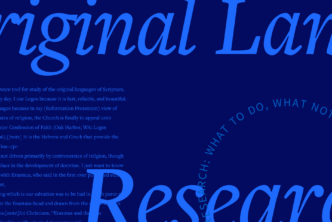Every year, Christians celebrate the birth of Jesus the Nazarene. Multiple Old Testament passages anticipate the unborn messiah in his mother’s womb. One such passage, Isaiah 49, predicts seven centuries in advance that God’s servant (Jesus) would be a human being, born of a woman (Mary). Note the passage I have bolded in this quotation from Isaiah 49. What do you make of them?
Coasts and islands, A listen to me;
Isaiah 49:1–6 CSB
distant peoples, pay attention.
The LORD called me before I was born.
He named me while I was in my mother’s womb.
He made my words like a sharp sword;
he hid me in the shadow of his hand.
He made me like a sharpened arrow;
he hid me in his quiver.
He said to me, “You are my servant,
Israel, in whom I will be glorified.”
But I myself said: I have labored in vain,
I have spent my strength for nothing and futility;
yet my vindication is with the LORD,
and my reward is with my God.
And now, says the LORD,
who formed me from the womb to be his servant,
to bring Jacob back to him
so that Israel might be gathered to him;
for I am honored in the sight of the LORD,
and my God is my strength—
he says,
“It is not enough for you to be my servant
raising up the tribes of Jacob
and restoring the protected ones of Israel.
I will also make you a light for the nations,
to be my salvation to the ends of the earth.”
I will tell you how I read this remarkable prophecy: Yahweh calls the Messiah from the womb, causes his name to be remembered from the loins of his mother, and forms him in her womb with a purpose—to be God’s servant by saving God’s people, Jew and Gentile alike.
4 reasons to see Jesus
Isaiah 49:3 reveals who Yahweh is speaking to: “My Servant, Israel.” Although several biblical excerpts identify God’s servant as the nation Israel (Isa 41:8–9; 44:1–2, 21; 45:4; Luke 1:54; etc.), the servant of Yahweh in Isaiah 49 must be an individual (Jesus) for four reasons.
1. The servant can’t be the nation
First, the servant cannot refer to the nation because the servant will bring the nation back to God:
And now, says the LORD,
who formed me from the womb to be his servant,
to bring Jacob back to him
so that Israel might be gathered to him.
2. The servant is an individual with a mother
Second, the first-person, individualized language in the immediate context means the “servant” cannot be a group. For example, the phrase “the body of my mother” fits an individual rather than a group (v. 1). And the servant’s mouth resembles a “sharp sword” (v. 2), which cannot be said of the deaf, blind, and obstinate nation of Israel (cf. Isa 65:2; Rom 10:21).
3. The servant appears elsewhere in Isaiah as the messiah
Third, Isaiah 49 constitutes one of four so-called “Servant Songs” in the book of Isaiah (chs. 42, 49, 50, 53). Expositors commonly identify the servant as the Son of God in these related texts. The famous “Suffering Servant” passage of Isaiah 53 links—“innertextually,” we say in biblical studies, because the links stand within one book—with Isaiah 49.
Compare, for instance, Isaiah 49:7 with Isaiah 52:13 and 53:3. I’ve again bolded especially relevant phrases:
This is what the LORD, the Redeemer of Israel, his Holy One, says to one who is despised, to one abhorred by people, to a servant of rulers. (Isa 49:7a)
My servant … was so disfigured that he did not look like a man, and his form did not resemble a human being. … He was despised and rejected by men, a man of suffering who knew what sickness was. He was like someone people turned away from; he was despised, and we didn’t value him. (Isa 52:13; 53:3)
These passages are clearly talking about the same servant—the same messiah.
4. Paul alludes to Isaiah 49 and refers it to Christ
Fourth, the New Testament apostles and prophets believed that the servant of Isaiah 49 was Jesus. This is apparent in Paul’s allusion to Isaiah 49:6 in Acts 26:23:
I stand and testify to both small and great, saying nothing other than what the prophets and Moses said would take place—that the Messiah would suffer, and that, as the first to rise from the dead, he would proclaim light to our people and to the Gentiles. (Acts 26:22–23)
The apostle John, too, evokes Isaiah 49:2:
A sharp sword came from his mouth, so that he might strike the nations with it. (Rev 19:15)
And the prophet Simeon recalls Isaiah 49:6 at the birth of Jesus:
My eyes have seen your salvation … a light for revelation to the Gentiles and glory to your people Israel. (Luke 2:30, 32)
There’s more. In Acts 13:47, Paul and Barnabas quote Isaiah 49:6, introducing the quote with “the Lord has commanded us [plural].”
This is what the Lord has commanded us: “I have made you a light for the Gentiles to bring salvation to the ends of the earth.” (Acts 13:47)
Did Paul and Barnabas take Isaiah 49:6 out of context by making themselves the referent (“the Lord has commanded us”) rather than the individual servant Jesus? Not at all. By introducing the quote this way, Paul and Barnabas were not claiming to be the servant of Isaiah 49; instead, they were claiming to accept his mission as his followers—his mission to “bring salvation to the ends of the earth.”
Christians today
Christians today can apply Isaiah 49:6 the same way Paul and Barnabas did—by being “a light of the nations” like the servant Jesus. Christmas is, obviously, a natural time to consider the coming of the Messiah. Holiday gatherings provide us with a wonderful opportunity to share the light of Christ with unbelieving family and friends.






